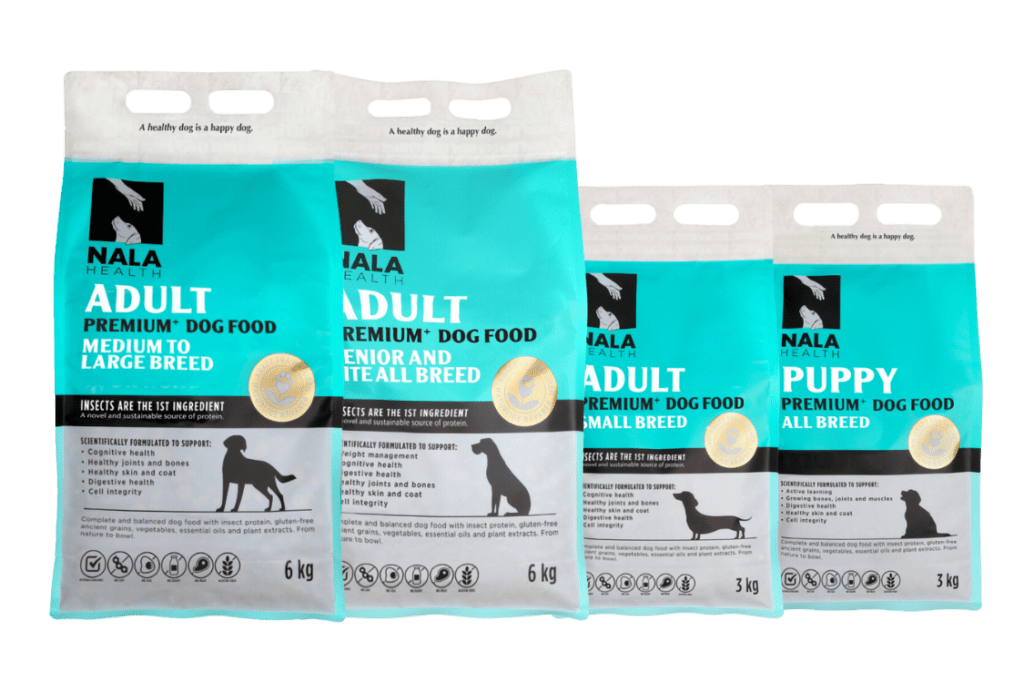The Importance of Puppy Dog Food
 Cecilie Hemsen Berg
Cecilie Hemsen Berg
“Dogs’ lives are too short. Their only fault, really.”
Agnes Sligh Turnbull
As a new or prospective puppy parent, understanding the importance of feeding your furry friend with dog food specifically formulated for their life stage is vital. Puppies grow rapidly and have specific nutritional needs to support their developing bodies and brains. That’s why Nala Health Puppy Food is expertly crafted to provide the perfect balance of nutrients, helping your young dog thrive during this critical phase. Tailored to meet the unique needs of growing pups, Nala Health ensures they’re set up for a lifetime of health and happiness. In this blog, we’ll explore why puppy-specific dog food isn’t just a marketing gimmick but an essential cornerstone of your puppy’s health and development.
Why Puppies Need Special Nutrition
Puppies have unique nutritional needs that differ significantly from adult dogs. Their rapid growth and high energy levels demand a diet specifically formulated to support their development. Here’s why:

- Growth and Development: Puppies grow at an extraordinary rate, developing muscles, bones, and organs. They need higher levels of nutrients to fuel this growth.
- Energy Needs: Puppies require more calories per pound of body weight compared to adult dogs to support their activity levels and metabolic demands.
- Brain and Cognitive Function: DHA omega-3 fatty acids are essential for brain and vision development.
- Bone and Joint Health: Balanced levels of calcium, phosphorus, and vitamin D ensure strong bones and prevent skeletal abnormalities.
- Immune System Support: Vitamins, minerals, and antioxidants are crucial for building a resilient immune system.
- Digestive Sensitivity: Puppy-specific formulas are designed to be easier on developing digestive systems, ensuring proper nutrient absorption.
Essential Nutrients for Puppies
Puppies require specific nutrients to support their growth and development. It is therefore beneficial to ook for:
- DHA Omega-3: Supports brain, vision, and cognitive function.
- Calcium and Phosphorus: Essential for strong bones and teeth. The balance in puppy food needs to be just right.
- Antioxidants: From rooibos, sea lettuce, and baobab to support the immune system.
- Probiotics: Maintain a healthy gut and support nutrient absorption.
Choosing the Right Puppy Food
Feeding your puppy the right food is one of the most important steps to support their growth, health, and happiness. With so many options available, it can be overwhelming to decide what’s best for your furry friend. From considering their breed size and specific nutritional needs to evaluating ingredient quality and texture, making informed choices is key.

1. Look at the ingredients list
High-quality ingredients are the foundation of good puppy food. Here’s what to look for and prioritise:
- Proteins: Look for named proteins like “lamb” or “black soldier fly larvae,” which provide digestible and sustainable nutrition.
- Healthy Fats: Ingredients like “coconut oil” or “cold-pressed rapeseed oil” are excellent sources of essential fatty acids.
- Complex Carbohydrates: Complex carbohydrates are low GI and nutritious to provide your dog with sustained energy throughout the day. Millet, sorghum, oats and sweet potato are great options.
- Avoid Low-Quality Ingredients: Stay away from generic terms like “meat meal” or “rendered fats” which can indicate heavily processed, low-nutrient components. Avoid cheap fillers like corn/maize, wheat or soy, which offer little nutritional value and may cause digestive issues
- Consult a Vet: Discuss your puppy’s specific needs with your veterinarian to choose the most suitable diet.
2. Special needs
If your puppy has any special dietary requirements such as food allergies, ensure the food you choose meets these needs. Allergy-friendly options like Nala Health Puppy Food are great for sensitive pups.

3. Choose the right texture
Puppy foods are available in a variety of different forms like dry, canned, wet and raw. Be mindful should you wish to make your own homemade diet, as these are often unbalanced and do not provide your puppy with the nutrients they need. Balancing a homemade diet is difficult and if done improperly it will negatively impact your puppy’s long-term health.
An other diet to be mindful of is raw food. It can be risky for young dogs, as it can lead to malnutrition, especially with calcium and phosphorous, if not balanced. Raw meat also contains bacteria, parasites and other pathogens that would normally be killed during the cooking process. Most recalls in the pet food industry come from raw food brands due to listeria, salmonella and E-coli.
4. Common Mistakes to Avoid
Feeding your puppy incorrectly can have long-term consequences on their health. Avoid these common pitfalls:
- Feeding Adult Food Too Early: Puppies need higher levels of nutrients than adult dogs. Switching too early can lead to deficiencies in calcium, protein, and other essential nutrients. It is important to consider your dog’s breed and size. Large bereds should stay on puppy food for longer than smaller breeds.
- Relying on Table Scraps: Human food is often not nutritionally balanced for puppies and may lead to weight issues or digestive problems.
- Using Unbalanced Homemade Diets: While homemade diets can be appealing, they’re difficult to balance without guidance from a veterinary nutritionist, potentially causing nutrient deficiencies.
How Nala Health Supports Your Puppy
Experienced animal nutritionists have formulated Nala Health puppy food to support:

- Active learning and cognitive development: Marine algae is a sustainable source of DHA omega 3 which contributes to concentration, attention and memory. DHA Omega 3 is an important nutrient for growing puppies’ brains.
- Growing bones, joints and muscles: Calcium, phosphorus, vitamin D and Omega 3 support joint health and overall skeletal development.
- Digestive health: Fiber and probiotics help to maintain healthy intestinal flora.
- Skin and coat: Cold-pressed rapeseed oil and coconut oil contain fatty acids that contribute to shiny fur and soft skin.
- The immune system: Rooibos, baobab fruit, sea lettuce and botanical extracts add antioxidants to the food that help protect the body against harmful free radicals.

How often should I feed my puppy?
Puppies depend on their mother’s milk (colostrum) until they are 4 weeks old. This milk is rich in nutrients and antibodies that help protect the puppies from illness while their immune systems are still developing.
Most puppies are fully weaned to solid food between 7 and 10 weeks of age, and they should eat three times a day from weaning through four to six months. After six months, they should eat twice a day.
Preventing lifestyle diseases
Scientists believe that 25% of health is connected to genes, whereas 75% of health is determined by lifestyle. Eating a healthy and balanced diet while maintaining a healthy weight can prevent many health issues like diabetes, heart disease, and joint problems. A healthy lifestyle includes:


The Risks of Feeding Adult Dog Food to Puppies
Feeding puppies adult dog food may lead to malnutrition and developmental problems. Puppies need the same nutrients as mature dogs, but adult dog food lacks the necessary nutrients in the required ratios for healthy puppy growth. For instance, insufficient calcium and phosphorus can lead to weak bones, while too little protein can stunt growth and muscle development.
Transitioning to Adult Dog Food
The transition from puppy food to adult dog food is another critical phase. This should be done gradually, typically around 12 months of age for most breeds, but larger breeds might require longer on puppy formulas. A sudden switch can cause digestive issues and disrupt nutrient intake.
Variety and diet rotation
Most dogs benefit from eating a variety of foods, to make mealtime more exciting with different flavours and textures. By rotating protein sources your dog is also less likely to develop sensitivity or allergy to certain ingredients. You can for example rotate between an insect-based diet and a venison-based diet. Discuss with your vet what would be best for your dog.


In general, added foods should represent only a small portion of the calories your dog consumes to avoid obesity and an unbalanced diet. Also, make sure you add food that is safe for dogs.
Healthy toppings to boost extra flavour and nutrition
- Eggs: Lightly scrambled, soft-boiled, or hard-boiled for a protein boost.
- Dairy: Cottage cheese, kefir, or plain yoghurt for probiotics and calcium.
- Steamed Vegetables: Butternut, sweet potato, green beans, cauliflower, or zucchini for added vitamins and fibre.
- Fruits and Berries: Apple, watermelon, blueberries, and blackberries; grated, mashed, or cut into small pieces for easy consumption.
- Offal/Organ Meat: Rich in iron, copper, magnesium, selenium, zinc, and B12, offal like liver or gizzards provides essential nutrients. Use in moderation to avoid overloading on fat-soluble vitamins or copper.
- Fish: Lightly steamed hake or sardines are excellent sources of omega-3 fatty acids. Avoid farmed fish like salmon due to potential contaminants like antibiotics and hormones.



Conclusion
In conclusion, providing your puppy with the right nutrition is one of the most important responsibilities we have as dog parents. Puppy-specific dog food plays a vital role in ensuring your young dog grows into a healthy, happy adult. Remember, investing in quality nutrition during these formative months is investing in your puppy’s future health and well-being. Feel free to share your experiences or ask questions. We love hearing from fellow dog enthusiasts!

